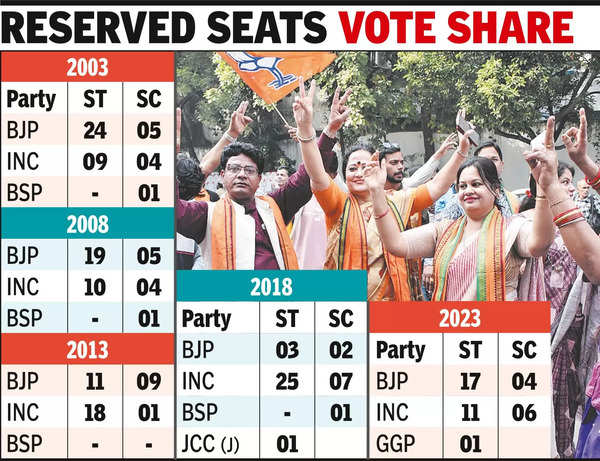From UPSC perspective, the following things are important :
Prelims level: Bihar Caste Survey
Mains level: BJP a substantive democratic party with a commitment to social justice

Central idea
The BJP’s success in recent Assembly elections, marked by significant support from marginalized social groups, challenges its previous image as a party of social elites. Under the umbrella of “Subaltern Hindutva,” the party employs strategies that include general welfare measures and addressing grievances of non-dominant OBC castes. However, the gap between mobilization tactics and substantive issues like economic empowerment and political representation for Dalit-Bahujan groups requires attention.
Key Highlights:
- The BJP has gained significant support from Scheduled Castes (SCs), Scheduled Tribes (STs), and Other Backward Classes (OBCs) in recent Assembly elections, challenging its earlier perception as a party of social elites.
- The phenomenon of “Subaltern Hindutva” under Prime Minister Narendra Modi’s leadership has contributed to the BJP’s success in mobilizing marginalized social groups.
- The BJP’s strategies include general welfare measures, addressing grievances of non-dominant OBC castes, and engaging lower strata through emotive narratives about their history, icons, and caste pride.
Key Challenges:
- Despite electoral gains, there is a gap between the BJP’s mobilization strategies and addressing substantive issues such as land distribution, representation in power, and economic participation for Dalit-Bahujan groups.
- The Bihar Caste Survey report reveals the precarious economic conditions, social insecurities, and lack of basic entitlements for Extremely Backward Classes (EBCs) and Dalits, emphasizing the need for more inclusive policies.
Key Terms and Phrases:
- Subaltern Hindutva
- Marginalized social groups
- Extremely Backward Classes (EBCs)
- Social justice policies
- Neo-liberal economic growth
- Democratisation of top political positions
- Social elites
- Communal rhetoric
- Ecological perspectives of Adivasis
- Democratization of power
Key Quotes:
- “With the arrival of Narendra Modi as the Prime Minister of India, there has been an elevation of the party as one for the socially marginalized Hindu masses — a phenomenon now understood under the ‘Subaltern Hindutva’ rubric.”
- “The BJP’s ‘Subaltern Hindutva’ strategies offer no mandate to satisfy the aspirations of the worst-off social groups.”
- “The BJP must pass the social justice test as sections among the historically disadvantaged have moved to the BJP with deep expectations for their economic welfare and elevated political participation.”
Critical Analysis:
- The BJP’s focus on emotive narratives and cultural events has succeeded in mobilizing marginalized groups, but substantive issues of economic empowerment and political representation need more attention.
- The Bihar Caste Survey underscores the continued challenges faced by EBCs and Dalits, indicating the need for the BJP to engage with these issues more effectively.
- Inclusivity in policies, representation in power, and equitable economic opportunities are crucial for the BJP to substantiate its commitment to the welfare of India’s subaltern masses.
Way Forward:
- The BJP should align its strategies with addressing the economic, social, and political challenges faced by Dalit-Bahujan groups, ensuring their meaningful participation in India’s development.
- Effective implementation of policies to uplift marginalized social groups is essential to make the BJP a substantive democratic party with a commitment to social justice.
- Engaging with the concerns of social justice and ensuring the emergence of subaltern leaders in various spheres will contribute to a more inclusive and democratic political landscape.
Get an IAS/IPS ranker as your 1: 1 personal mentor for UPSC 2024
